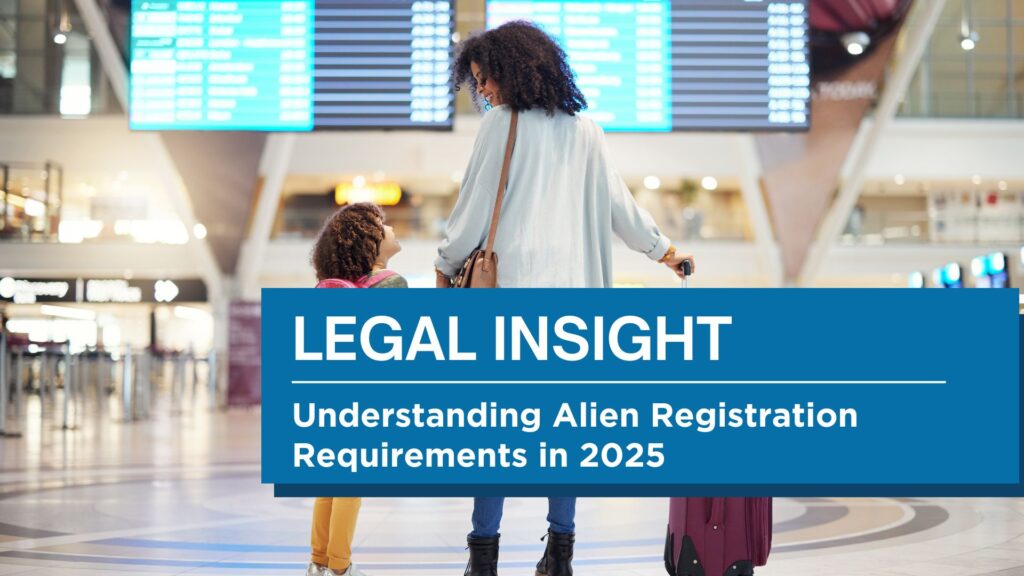
What Every Noncitizen Needs to Know – Especially If You’re in New Jersey
If you’re a foreign national currently living in or entering the United States for an extended stay, it’s crucial to understand the Alien Registration laws—especially as new enforcement measures took effect on April 11, 2025.
At VKM Law Group, a trusted immigration law firm based in New Jersey, we help individuals navigate complex legal landscapes like this one. Here’s everything you need to know about this critical requirement.
What Is Alien Registration?
Under the Alien Registration Act of 1940, all foreign nationals aged 14 or older who are in the U.S. for 30 days or more must register and be fingerprinted. Noncitizens 18 and older must also carry proof of registration at all times. Failure to comply may result in fines, a criminal misdemeanor, or imprisonment.
While this law has historically seen minimal enforcement, the Trump administration reactivated the policy in 2025, introducing Form G-325R, an online registration tool to standardize compliance.
Who Needs to Register?
The mandate applies to:
- Canadians entering through land borders without an I-94.
- Undocumented immigrants not previously registered or issued any registration document.
- Noncitizen minors turning 14 in the U.S.
- Lawful Permanent Residents (LPRs) returning to the U.S. after turning 14 abroad.
- Individuals previously granted Deferred Action or Temporary Protected Status without registration documentation.
⚠️ If you are undocumented, registration does not confer legal status and may carry risks, including detention or removal. It’s vital to consult with an immigration attorney in New Jersey or your local area before taking any steps.
Who Is Already Registered?
You may already be considered registered if:
- You are a Lawful Permanent Resident.
- You entered the U.S. with a nonimmigrant visa and were issued an I-94 or I-94W.
- You were paroled into the U.S., even if the parole period has expired.
- You’ve been placed into removal proceedings or have filed for asylum or adjustment of status.
Who Is Exempt?
The following individuals are not required to register:
- U.S. citizens
- G visa holders and other diplomatic visa holders
- Visa holders already fingerprinted during visa issuance
- People in the U.S. less than 30 days
- Certain American Indians born in Canada
How to Register with USCIS
To register, complete Form G-325R through your USCIS online account. Here’s how:
- Create an account at my.uscis.gov.
- Fill out and submit Form G-325R with your biographic and immigration history.
- Attend a biometrics appointment at a local Application Support Center.
- Receive your registration proof online after background checks.
The form requires you to certify under penalty of perjury, and grants DHS access to personal records. Again, legal advice is recommended.
What Counts as Proof of Registration?
Documents considered valid registration proof include:
- I-94/I-94W (even if expired)
- I-551 (Green Card)
- I-766 (Work Permit)
- I-862 (Notice to Appear)
- I-185 or I-186 (Border Crossing Cards)
- USCIS-issued employment authorization or parole documents
For a complete list, consult the regulation under 8 CFR §264.1(b) or contact a qualified immigration attorney near you.
Legal Risks of Non-Compliance
Failing to register within 30 days of entry or turning 14 can result in:
- Civil fines
- Criminal charges
- Increased risk of deportation
More importantly, registering can alert DHS to your presence, potentially triggering removal proceedings if you’re out of status.
Why Consult an Immigration Attorney?
At VKM Law Group, we specialize in helping immigrants understand their rights and protect their future. Before registering, you should:
- Understand how the registration impacts your immigration case.
- Prepare required documents correctly.
- Identify if you are already considered registered.
If you’re unsure where you stand, contact our office for a confidential consultation with an immigration attorney in New Jersey.